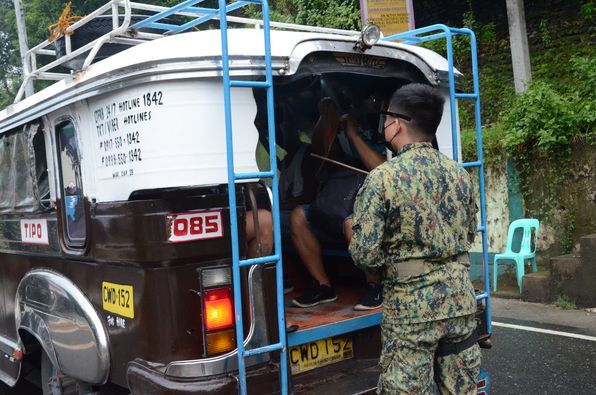
A policeman in Olongapo City inspects a passenger jeepney to ensure that health protocols are being followed. (Photo courtesy of Olongapo City Information Center)
MANILA, Philippines — More than 136,000 valid franchise holders of public utility jeepneys (PUJ) nationwide will receive a one-time fuel subsidy per vehicle to help them cope with soaring fuel prices, the Department of Transportation (DOTr) said on Wednesday.
Using a P1-billion allocation from the Development Budget Coordination Committee (DBCC), the DOTr and the Land Transportation Franchising and Regulatory Board (LTFRB) will start distributing “Pantawid Pasada Program” (PPP) fuel cards loaded with P7,200 credit to beneficiaries.
The DOTr said jeepney drivers can use the cards to purchase fuel only at participating petroleum retail outlets or gasoline stations.
Using the card to purchase other products aside from fuel “will automatically disqualify the card owner” from the program.
This was not the first time that the government offered fuel subsidies to distressed transport workers. The PPP program was initially implemented in 2018 and 2019 in compliance with the provisions of Republic Act No. 10963 or the Tax Reform for Acceleration and Inclusion (TRAIN) Act.
Active cards
In a press briefing on Wednesday, LTFRB National Capital Region Director Zona Tamayo said the fuel subsidy would be directly distributed to the beneficiaries with valid and existing PPP cards issued by the Land Bank of the Philippines.
Some 85,000 beneficiaries have active PPP cards and can immediately redeem their fuel subsidy from branches of nine participating gas companies, Tamayo said.
Landbank has downloaded the fuel subsidy to the PPP cards of 78,000 beneficiaries as of Tuesday, she added.
For beneficiaries without PPP cards, the LTFRB said the fuel subsidy would be deposited to the beneficiaries’ Landbank accounts once opened.
Beneficiaries can then claim their PPP cards from designated Landbank branches.
Bill to suspend tax
Successive increases in the prices of gasoline, diesel and kerosene last month prompted calls from transport groups, public vehicle drivers and operators for a corresponding increase in fares. Lawmakers also filed bills seeking to suspend the excise on fuel products, citing the domino effect of high oil prices on the cost of food and other commodities.
But while oil prices have been on a downward trend in the past three weeks, there is still a need to pass the House bill suspending and reducing excise on fuel for six months, Quezon City Rep. Jesus Suntay said.
Suntay, the House deputy majority leader, is one of the authors of House Bill No. 10488 which seeks to cut the excise on diesel, kerosene and liquefied petroleum gas (LPG) to zero. Under the bill, taxes on low-octane gasoline, which is often used by tricycle drivers, will be reduced to P4.35 per liter. For premium gasoline, the excise is P7 per liter.
Can still go up
“We still need to push through with it… Regardless of whether oil prices are going down, it doesn’t mean that we should stop the approval of the measure, which is now on second reading,” Suntay said in an online press briefing on Wednesday.
“Although prices have been going down for the past weeks, the way I look at it, oil prices can still go up especially since winter is about to start in America and Europe,” he said.
Prices of fuel products have been on the downtrend for the past three weeks, with rollbacks of as much as P1.20 per liter for diesel and P.85 per liter for gasoline this week. But the lawmaker noted that even with the series of rollbacks, the price of Dubai crude oil has not yet dropped to $65 a barrel.
HB 10488 states that the fuel excise will revert to the regular rate once Dubai crude oil reaches $65 a barrel.
A similar measure, Senate Bill No. 2445, was recently filed by Sen. Grace Poe.